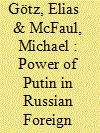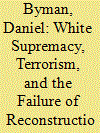|
|
|
Sort Order |
|
|
|
Items / Page
|
|
|
|
|
|
|
| Srl | Item |
| 1 |
ID:
179883


|
|
|
|
|
| Summary/Abstract |
Why do modern states recruit legionnaires—foreigners who are neither citizens nor subjects of the country whose military they serve? Rather than exclusively enlist citizens for soldiers, for the past two centuries states have mobilized legionnaires to help wage offensives, project power abroad, and suppress dissent. A supply-and-demand argument explains why states recruit these troops, framing the choice to mobilize legionnaires as a function of political factors that constrain the government's leeway to recruit domestically and its perceptions about the territorial threats it faces externally. A multimethod approach evaluates these claims, first by examining an original dataset of legionnaire recruitment from 1815 to 2020, then by employing congruence tests across World War II participants, and finally by conducting a detailed review of a hard test case for the argument—Nazi Germany. The prevalence of states’ recruitment of legionnaires calls for a reevaluation of existing narratives about the development of modern militaries and provides new insights into how states balance among the competing imperatives of identity, norms, and security. Legionnaire recruitment also underscores the need to recalibrate existing methods of calculating net assessments and preparing for strategic surprise. Far from being bound to a state's citizenry or borders, the theory and evidence show how governments use legionnaires to buttress their military power and to engineer rapid changes in the quality and quantity of the soldiers that they field.
|
|
|
|
|
|
|
|
|
|
|
|
|
|
|
|
| 2 |
ID:
179884


|
|
|
|
|
| Summary/Abstract |
Michael McFaul's article “Putin, Putinism, and the Domestic Determinants of Russian Foreign Policy” is well timed and likely to play a big role in shaping the debate about contemporary Russian foreign policy.1 The core argument is straightforward: President Vladimir Putin's illiberal worldviews are a major driver of Russia's international behavior. To be clear, McFaul acknowledges that other factors influence Russian behavior as well. In particular, he stresses that the balance of power enables Putin to pursue a confrontational foreign policy, but the balance of power does not motivate or cause his actions (pp. 102–105). Similarly, Russia's increasingly authoritarian political system serves as a permissive condition, concentrating decisionmaking authority in the hands of Putin (pp. 114–117). Thus, while McFaul recognizes that power and regime-type variables affect Russia's international behavior, the heavy causal lifting is done by Putin's illiberal conservatism and anti-Western mindset.
|
|
|
|
|
|
|
|
|
|
|
|
|
|
|
|
| 3 |
ID:
179880


|
|
|
|
|
| Summary/Abstract |
Why do states trade with their enemies during war? States make deliberate choices when setting their wartime commercial policies, and tailoring policies to match the type of war the states are expecting to fight. Specifically, states seek to balance two goals–maximizing revenue from continued trade during the war and minimizing the ability of the opponent to benefit militarily from trade. As a result, states trade with the enemy in (1) products that their opponents take a long time to convert into military capability, and (2) products that are essential to the domestic economy. Furthermore, states revise their wartime commercial policies based on how well they are doing on the battlefield. An analysis of British wartime commercial policy in World War I finds that a product's conversion time into military capabilities determines if and when that product will be prohibited from trade during the war. Alternatively, domestic political pressures play only a marginal role in wartime commercial policy decisions.
|
|
|
|
|
|
|
|
|
|
|
|
|
|
|
|
| 4 |
ID:
179882


|
|
|
|
|
| Summary/Abstract |
Why is it that international ideological enemies—states governed by leaders engaged in deep disputes about preferred domestic institutions and values—are sometimes able to overcome their ideological differences and ally to counter shared threats, and sometimes they are not? Alliances among ideological enemies confronting a common foe are unlike coalitions among ideologically similar states facing comparable threats. Members of these alliances are perpetually torn by two sets of powerful contending forces. Shared material threats push these states together, while the effects of ideological differences pull them apart. To predict when ideological enemies are and are not likely to ally in the pursuit of common interests, it is necessary to know which of these contending forces is likely to dominate at a particular time. The values of two ideological variables beyond that of ideological enmity play the key role in determining outcomes: (1) states’ susceptibility to major domestic ideological changes and (2) the nature of the ideological differences among countries. Similar levels of ideological enmity and material threats will have vastly different effects on leaders’ alliance policies as the values of these additional ideological variables alter.
|
|
|
|
|
|
|
|
|
|
|
|
|
|
|
|
| 5 |
ID:
179881


|
|
|
|
|
| Summary/Abstract |
Reconstruction failed in the United States because white Southerners who were opposed to it effectively used violence to undermine Black political power and force uncommitted white Southerners to their side. Although structural factors made it harder to suppress this violence, a series of policy failures proved most important. The Radical Republican-led U.S. government did not deploy enough troops or use them aggressively. Nor did it pursue alternative paths that might have made success more likely, such as arming the Black community. The violence caused Reconstruction to fail, and the victorious white supremacists embedded structural racism into the post-Reconstruction political and social system in the South. Reconstruction's failure illustrates the dangers of half measures. The United States sought to reshape the American South at low cost, in terms of both troop levels and time. In addition, the failure indicates the importance of ensuring that democratization includes the rule of law, not just elections. Most important, Reconstruction demonstrates that a common policy recommendation—compromise with the losers after a civil war—is often fraught, with the price of peace being generations of injustice.
|
|
|
|
|
|
|
|
|
|
|
|
|
|
|
|
|
|
|
|
|